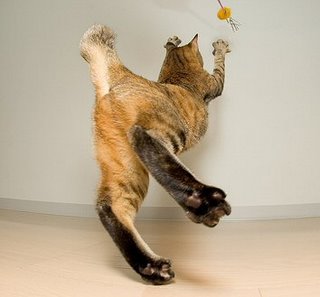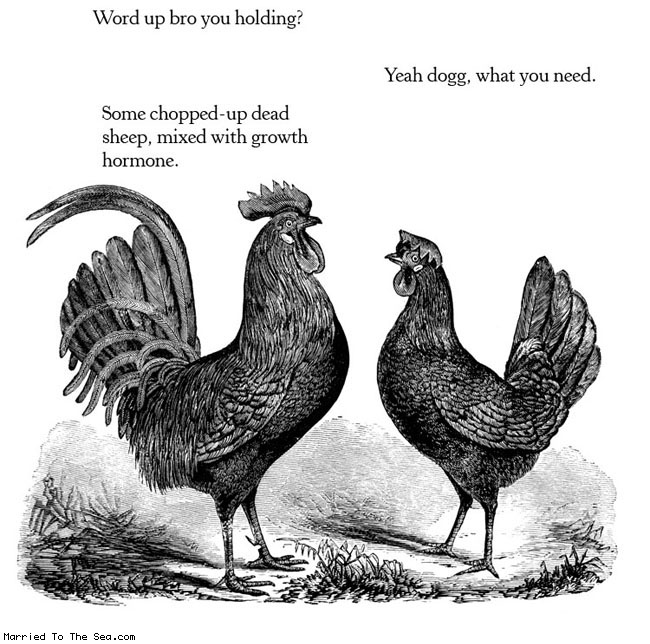"bad is stronger than good" is an important principle of design by evolution. "Responses to threats and unpleasantness are faster, stronger, and harder to inhibit than responses to opportunities and pleasures." This is a matter of how our brains are wired: most sense data pass through the amygdala, which helps control our fight-or-flight response, before being processed by other parts of our cerebral cortex.
Meanwhile, Darrin McMahon, a historian at Florida State University, argues in his book "Happiness: A History" that
the idea of happiness is not a human universal that applies across all times and all cultures but a concept that has demonstrably changed over the years. When your attention is fully concentrated on questions of survival, you don't have the time or the inclination even to formulate the idea of happiness. You have to begin to feel that you have some control over your circumstances before youbegin to ask yourself questions about your own state of mind.
So, already we've established that people may be more or less hard-wired to be anxious. This may be something of a comfort for those like me who have resorted to all kinds of meditations and medications to allay chronic stress, but at the same time can make the struggle seem somewhat Sisyphean. After all, how much nature can we fight with nurture?
At the same time, it's not surprising to find that the very concept of happiness has evolved over time. For early humans (and sadly, still for many today), just having a full belly could be cause for celebration. That is why so many holidays center around feasts, even when in modern times a Taco Bell or Hot Pocket is within easy reach for most North Americans at any given moment. However, as we gain more luxuries and tools, it doesn't necessarily make us happier. Why is this? Lanchester writes:
The simplest kind of unhappiness is that caused by poverty. People living in poverty become happier if they become richer-but the effect of increased wealth cuts off at a surprisingly low figure. The British economist Richard Layard, in his stimulating book "Happiness: Lessons from a New Science," puts that figure at fifteen thousand dollars, and leaves little doubt that being richer does not make people happier. Americans are about twice as rich as they were in the nineteen-seventies but report not being any happier; the Japanese are six times as rich as they were in 1950 and aren't any happier, either. Looking at the data from all over the world, it is clear that, instead of getting happier as they become better off, people get stuck on a "hedonic treadmill": their expectations rise at the same pace as their incomes, and the happiness they seek remains constantly just out of reach.
Speaking of treadmills, I was running on one yesterday morning as I mulled these issues over during my workout. Why have I been so pessimistic over time and why do I continue to do and experience this even though it clearly leads to aborting experiences that could cause me happiness, perhaps disproving my negative assumptions? Is it because I am somehow hard-wired with a given level of happiness that is almost impossible to transcend, as Haidt maintains? Or is it because my definition of happiness is always changing, i.e. the more I have the more I want, as Layard and McMahon hypothesize? As often happens, I idly checked out one of the television monitors above the exercise machines at my gym. In place of the usual morning news programs or cartoons, however, there was a religious show.
Joyce Meyer, who apparently runs a large (and no doubt highly profitable) Christian ministry, was on stage exhorting church members to let go of anger against those who had wronged them in the past and put out love instead in order to feel happy. Many folks in the audience were clearly moved as she described how she had overcome the devastation and anger resulting from childhood abuse through spreading joy in Jesus' name.
Now, while I watched all this I was skeptical, as I usually am when it comes to God Talk. After all, most televangelists also happen to have admirers galore, mansions and various other riches to keep them happy, which makes speaking for God, whatever they think that means, a rather fulfilling affair for them. But, it did bring to mind something that many religions and philosophies do emphasize as the path to happiness: to stop worrying about things and let some greater being or concept - be it Jesus, nature, fate or mere time - take over your emotional burdens. I may not believe, like Meyer purports to, that all of my negative thoughts are caused by Satan, but I've studied enough of both Buddhist practices and basic psychology to gather that a mind fully in the present and engaged tends to be content, whereas focusing on the future or past can breed tension.


And there's the crux, because our society is not geared toward that. Except in rare cases, the modern pursuit of happiness is sold to us not just as general well-being and safety, but as acquisition. How can you truly feel safe if you don't have a huge SUV and a house you own? How can you feel worthwhile when you are not protecting your loved ones with the proper insurance and investment plans? And while you're doing all that, you've got to reward yourself, don't you? After all, how can you be a respectable part of society if you don't keep up with what the Joneses own?
This is addressed again in this week's New Yorker by John Cassidy. In his article, "Relatively Deprived", Cassidy notes that, since the mid-20th century, methods for calculating the poverty level in the United States have been based on comparing a minimum required income to provide food multiplied by three, assuming that the cost of food took up one-third of the typical family's budget, on average. However,
In 1995, a panel of experts assembled by the National Academy of Science concluded that the Census Bureau measure "no longer provides an accurate picture of the differences in the extent of economic poverty among population groups or geographic areas of the country, nor an accurate picture of trends over time." The panel recommended that the poverty line be revised to reflect taxes, benefits, childcare, medical costs, and regional differences in prices. Statisticians at the Census Bureau have experimented with measures that incorporate some of these variables, but none of the changes have been officially adopted.
It comes as no surprise that no one can agree on the variables. For one thing, there's just too many of them. For another, the issue is highly political: conservatives would like the numbers cooked so that they indicate less poor folks exist, whereas liberals fear that moving away from basic, subsistence figures will result in priorities becoming confused and some poor populations missing out. But, perhaps most important of all, recognizing that poverty is dependant on multiple variables indicates that it is not so much dependant on actual goods as relative wealth. For example,
Although many poor families own appliances once associated with rich households, such as color televisions and dishwashers, they live in a society in which many families also possess DVD players, cell phones, desktop computers, broadband Internet connections, powerful game consoles, S.U.V.s, health-club memberships, and vacation homes. Without access to these goods, children from poor families may lack skills-such as how to surf the Web for help-wanted ads-that could enhance their prospects in the job market. In other words, relative deprivation may limit a person's capacity for social achievement."
Not only is it a handicap in terms of social achievement, however, but in social rank and yes, happiness. Recent studies have shown that workers' reported levels of job satisfaction had less to do with their salaries than with how their salaries compared with those of co-workers. It seems that humans, like other animals, tend to compare ourselves to others in our community and rank ourselves accordingly. This is why a simple farmer in a small Third-World village may feel more relatively wealthy and happy than a middle manager in a North American corporation. The farmer compares himself to the people around him, who are working hard just to survive, and appreciates it when he gains luxuries or has a good crop. The middle manager wants to be a high-level manager and buy new car, even though she usually doesn't worry about having enough to eat.
So, what's it all about? Clearly, how we perceive and rank our happiness is complex. One may have to factor in one's hereditary threshold of happiness alongside the goods we own, weigh our spiritual beliefs against the standards of our community, and understand both our tendency to socially rank ourselves and our historical definitions of just what happiness is. It's enough to make feeling good feel impossible. Still, it can be done. According to Haidt, "It's better to win the lottery than to break your neck, but not by as much as you'd think. . . . Within a year, lottery winners and paraplegics have both (on average) returned most of the way to their baseline levels of happiness." This is not just because the paraplegics descended from happy folk and the lottery winners had anxious ancestors and rich neighbours, but because of two basic things:
1. Everything is relative, and
2. Happiness does not bear analysis well. As what might be considered a middle-class New Yorker, if I compare myself to the poor, Third World farmer, I'm likely to feel very fortunate, but if I compare myself to a rich Manhattan stock analyst, I feel relatively poor and socially unimportant. This affects my happiness. However, clearly it is how I conduct that very comparison and analysis that undermines my personal happiness. I can - and often do - feel just as unhappy because I am angry that my life is not as straightforward as the farmer, or I'm not appreciating what I do have in comparison. I may be pissed off that how others treat me is based on my wealth compared to the banker, or feel better about myself because I've done alright without the benefits of greater wealth and see myself as morally superior than those who doggedly seek them.
To counter this, I can try to train myself to always compare oneself somewhat favourably. But this involves some sort of trick of the mind, be it through faith, learned habit or sheer force of will. One way or another, it seems, I will have to overcome my patterns of comparison, be they part of my genes or learning, to always look on the bright side. Simple, but not easy. And chances are, at some point, whether through insecurity or objective analysis I'm going to come up short next to someone else.
So, let's say I try not to compare myself to others at all. Lanchester writes:
In the end, the philosophy and the science converge on the fact that thinking about your own happiness does not make it any easier to be happy. A co-founder of positive psychology, Mihaly Csikzentmihalyi, made people carry a pager, and told them that every time it went off they should write down what they were doing and how much they were enjoying it. The idea was to avoid the memory's tendency to focus on peaks and troughs, and to capture the texture of people's lives as they were experiencing them, rather than in retrospect. The study showed that people were most content when they were experiencing what Csikzentmihalyi called "flow"-in Haidt's definition, "the state of total immersion in a task that is challenging yet closely matched to one's abilities." We are at our happiest when we are absorbed in what we are doing; the most useful way of regarding happiness is, to borrow a phrase of Clive James's, as "a by-product of absorption."Considering this, it would seem that the ultimate key to happiness is to not compare oneself with other people or possibilities by being focused on the present. However, as comparing seems to be animal nature and how we understand who we are in the world, it is nigh on impossible to avoid. As countless seekers, mystics and philosophers have discovered, I may simply try to be engaged in life, but the moment I ask find myself asking if I am happy, I become less so. It takes another type of mind trick or training not to fall into thinking "too much". So, what are we who are generally cynical to do? Find some way to stop thinking about how we feel, or convince ourselves we feel good, somehow? Either path is difficult and requires training and faith. But then, being constantly unhappy requires the same. How else do we see all before us as displeasing or deficient?
Which do you choose?





 ... because I finally downloaded The Darkness' latest album, "
... because I finally downloaded The Darkness' latest album, "



 I grew up near the
I grew up near the 

 Fast forward to WWII, and you can see why a lot more cargo cults started up. Western troops came in droves to the isolated islands in the South Pacific, bringing huge amounts of equipment, food and other matériel with them. Locals must have been agog at the influx of durable goods, not to mention the food that practically rained from the sky, either by landing strip or parachute drop. It only stands to reason that islanders figured that if they performed certain rituals, such as cutting imitation landing strips, donning imitation uniforms or worshipping a god that was somehow connected to all this wealth, they might be showered with riches, too. In Tanna, this manifested as the Jon Frum movement, in which a white, American military messiah promised to bring cargo back to the islanders if they prayed to him. Jon Frum is currently thought to reside alternately in the local volcano or America, as he can travel by underground tunnel between the two, and 60 years later Tanna residents still pray to him and celebrate Jon Frum day annually with dancing, singing and mock United States military drills.
Fast forward to WWII, and you can see why a lot more cargo cults started up. Western troops came in droves to the isolated islands in the South Pacific, bringing huge amounts of equipment, food and other matériel with them. Locals must have been agog at the influx of durable goods, not to mention the food that practically rained from the sky, either by landing strip or parachute drop. It only stands to reason that islanders figured that if they performed certain rituals, such as cutting imitation landing strips, donning imitation uniforms or worshipping a god that was somehow connected to all this wealth, they might be showered with riches, too. In Tanna, this manifested as the Jon Frum movement, in which a white, American military messiah promised to bring cargo back to the islanders if they prayed to him. Jon Frum is currently thought to reside alternately in the local volcano or America, as he can travel by underground tunnel between the two, and 60 years later Tanna residents still pray to him and celebrate Jon Frum day annually with dancing, singing and mock United States military drills.
 I have sampled this elixir myself, in a small bar in Hawaii, where it is called 'awa. I've long been a veritable teetotaler, not just through the natural process of becoming older and holding a day job, but because the anti-depressants I take seem to alter the effects of alcohol. Liquor tends to give me very little buzz. Instead, I just get tired and then don't sleep well. When I heard about 'awa shortly before my trip to the big island, I figured it might be fun to try. Touted as relatively harmless if somewhat unappetizing, 'awa is part of a traditional local custom I could experience, and maybe get a little mood elevation while at it.
I have sampled this elixir myself, in a small bar in Hawaii, where it is called 'awa. I've long been a veritable teetotaler, not just through the natural process of becoming older and holding a day job, but because the anti-depressants I take seem to alter the effects of alcohol. Liquor tends to give me very little buzz. Instead, I just get tired and then don't sleep well. When I heard about 'awa shortly before my trip to the big island, I figured it might be fun to try. Touted as relatively harmless if somewhat unappetizing, 'awa is part of a traditional local custom I could experience, and maybe get a little mood elevation while at it.
 The upshot of the Jon Frum movement is that the Tanna islanders shooed the colonists off of their home, but although they have gained independence, the cult still signifies a strange reverence of Western ways and goods despite rejecting Western rule. More worldly natives are sometimes embarrassed by this "backwards" group, while others revere them as some of the first freedom fighters in the island chain. Meanwhile, splinter cults have developed that incorporate more traditional or Christian customs, including the flock of one Prophet Fred, who recently came to bloody blows with the main Frum devotees. Still, while this may seem bizarre and somewhat sad to the casual first-world observer, our beliefs are not all that different, at the core, and the islanders know it. One notes:
The upshot of the Jon Frum movement is that the Tanna islanders shooed the colonists off of their home, but although they have gained independence, the cult still signifies a strange reverence of Western ways and goods despite rejecting Western rule. More worldly natives are sometimes embarrassed by this "backwards" group, while others revere them as some of the first freedom fighters in the island chain. Meanwhile, splinter cults have developed that incorporate more traditional or Christian customs, including the flock of one Prophet Fred, who recently came to bloody blows with the main Frum devotees. Still, while this may seem bizarre and somewhat sad to the casual first-world observer, our beliefs are not all that different, at the core, and the islanders know it. One notes:
 Which also means, South Pacific or New York City, I deserve some damn kava now and then. Fortunately, I don't have to perform any intricate rituals to get it. It looks like chanting the sacred numbers of Master Card to the gods of the Internet should do.
Which also means, South Pacific or New York City, I deserve some damn kava now and then. Fortunately, I don't have to perform any intricate rituals to get it. It looks like chanting the sacred numbers of Master Card to the gods of the Internet should do.
 Alas, I have no photograpic evidence of this event. As it was, we could barely keep our spleens in from laughing as he ricocheted to the floor. There is a chance we could reenact it, however. How much is the prize on America's Funniest Home Videos up to?
Alas, I have no photograpic evidence of this event. As it was, we could barely keep our spleens in from laughing as he ricocheted to the floor. There is a chance we could reenact it, however. How much is the prize on America's Funniest Home Videos up to? I was just waiting for it to become cheesy or offensive. But it didn't. In fact, in it's premiere episode, Black. White. got just about everything right. They didn't choose stereotypical families to participate, but real, thoughtful people. They made them up convincingly enough that outsiders they interacted with seemed genuinely fooled (although I'm not sure how - they definitely look "off" somehow on camera, perhaps akin to burn victims who need to cover their wounds with prostheses and cosmetics). And most of all, they put them in situations where they could really learn, from discussion groups on race to country clubs, slam poetry classes to the kicker, living together in the same house. The cameras didn't shy away from uncomfortable moments, such as the black father, while in his white undercover role, being told by a white stranger that his neighbourhood was one of the last all-white middle-class bastions in L.A., and thus a safe place to raise his kids. But while the producers made the show thought-provoking, they didn't resort to too many cheap stunts like competitions or incendiary exercises or messages. So far, things has been kept as relatively "real" as they can in a show based on disguise.
I was just waiting for it to become cheesy or offensive. But it didn't. In fact, in it's premiere episode, Black. White. got just about everything right. They didn't choose stereotypical families to participate, but real, thoughtful people. They made them up convincingly enough that outsiders they interacted with seemed genuinely fooled (although I'm not sure how - they definitely look "off" somehow on camera, perhaps akin to burn victims who need to cover their wounds with prostheses and cosmetics). And most of all, they put them in situations where they could really learn, from discussion groups on race to country clubs, slam poetry classes to the kicker, living together in the same house. The cameras didn't shy away from uncomfortable moments, such as the black father, while in his white undercover role, being told by a white stranger that his neighbourhood was one of the last all-white middle-class bastions in L.A., and thus a safe place to raise his kids. But while the producers made the show thought-provoking, they didn't resort to too many cheap stunts like competitions or incendiary exercises or messages. So far, things has been kept as relatively "real" as they can in a show based on disguise.  I am curious to see, however, if the black family finds their preconceptions changed whatsoever from the exercise. They know many white people are prejudiced, and what it is to have to "act white" to get along in life. This puts the parents, Brian and Renee, in the all-too-common role of educators and defenders of their own perspective that blacks often find themselves forced into in the presence of "progressive" whites. It's not lynching-variety racism, but it is is another burden, one that most minorities carry when faced with the juggernaut of the "average" American culture (read: privileged, male, heterosexual, Christian, caucasian). Meanwhile, the teenaged son, Nick, claims that, amongst his generation, racism is dead, which may point to evolving youth culture but, sadly, naiveté, as well. As a gay person, I am thrilled that more queer youths feel they can come out in high school, but that doesn't make me believe they won't face discrimination along the line. Unfortunately, I'd wager that his is the viewpoint most likely to be changed with experience.
I am curious to see, however, if the black family finds their preconceptions changed whatsoever from the exercise. They know many white people are prejudiced, and what it is to have to "act white" to get along in life. This puts the parents, Brian and Renee, in the all-too-common role of educators and defenders of their own perspective that blacks often find themselves forced into in the presence of "progressive" whites. It's not lynching-variety racism, but it is is another burden, one that most minorities carry when faced with the juggernaut of the "average" American culture (read: privileged, male, heterosexual, Christian, caucasian). Meanwhile, the teenaged son, Nick, claims that, amongst his generation, racism is dead, which may point to evolving youth culture but, sadly, naiveté, as well. As a gay person, I am thrilled that more queer youths feel they can come out in high school, but that doesn't make me believe they won't face discrimination along the line. Unfortunately, I'd wager that his is the viewpoint most likely to be changed with experience. 


 If they can find a cost-effective, environmentally friendly way to use this natural resource to help power the grid, I'm all for it. But, most importantly, and I think what all of us are wondering here, is, what's in it for Da Nator?
If they can find a cost-effective, environmentally friendly way to use this natural resource to help power the grid, I'm all for it. But, most importantly, and I think what all of us are wondering here, is, what's in it for Da Nator?